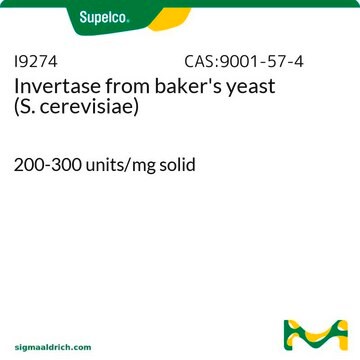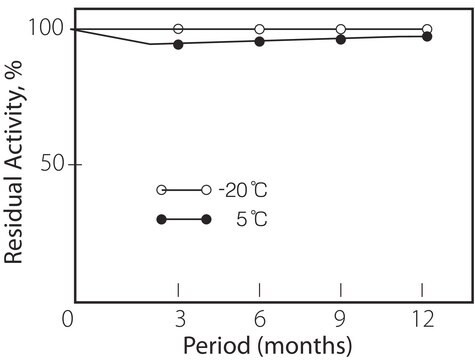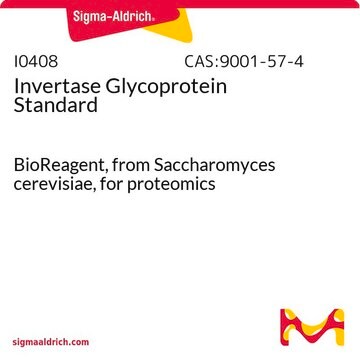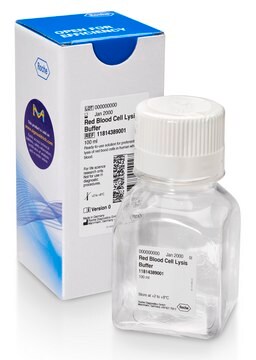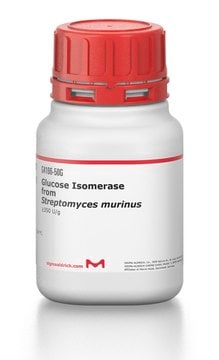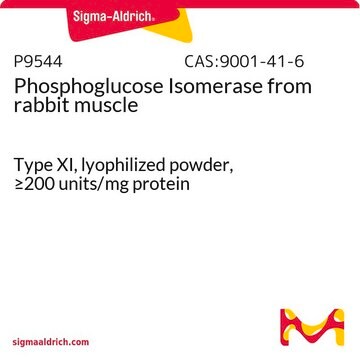I4504
Invertase from baker′s yeast (S. cerevisiae)
Grade VII, ≥300 units/mg solid
Synonym(s):
β-D-Fructofuranosidase, β-D-Fructofuranoside fructohydrolase, Saccharase
Sign Into View Organizational & Contract Pricing
All Photos(3)
About This Item
Recommended Products
biological source
bakers yeast
Quality Level
type
Grade VII
form
solid
specific activity
≥300 units/mg solid
foreign activity
α-galactosidase (melibiase) ≤0.01%
storage temp.
−20°C
Looking for similar products? Visit Product Comparison Guide
Application
Used in the production of confectionary foods and artificial honey.
Biochem/physiol Actions
Invertase hydrolyzes sucrose into glucose and fructose yielding a colorless product, unlike acid hydrolysis which produces colored products.
Unit Definition
One unit will hydrolyze 1.0 μmole of sucrose to invert sugar per min at pH 4.5 at 55°C.
Signal Word
Danger
Hazard Statements
Precautionary Statements
Hazard Classifications
Resp. Sens. 1
Storage Class Code
10 - Combustible liquids
WGK
WGK 3
Personal Protective Equipment
dust mask type N95 (US), Eyeshields, Gloves
Choose from one of the most recent versions:
Certificates of Analysis (COA)
Lot/Batch Number
Don't see the Right Version?
If you require a particular version, you can look up a specific certificate by the Lot or Batch number.
Already Own This Product?
Find documentation for the products that you have recently purchased in the Document Library.
Customers Also Viewed
Tatiana Q Aguiar et al.
Molecular biotechnology, 56(6), 524-534 (2014-01-24)
The repertoire of hydrolytic enzymes natively secreted by the filamentous fungus Ashbya (Eremothecium) gossypii has been poorly explored. Here, an invertase secreted by this flavinogenic fungus was for the first time molecularly and functionally characterized. Invertase activity was detected in
Bryan J Leong et al.
Science advances, 5(4), eaaw3754-eaaw3754 (2019-04-30)
Plants produce a myriad of taxonomically restricted specialized metabolites. This diversity-and our ability to correlate genotype with phenotype-makes the evolution of these ecologically and medicinally important compounds interesting and experimentally tractable. Trichomes of tomato and other nightshade family plants produce
Derek Fleming et al.
Biofilm, 2, 100037-100037 (2021-01-16)
The complexity of microbial biofilms offers several challenges to the use of traditional means of microbial research. In particular, it can be difficult to calculate accurate numbers of biofilm bacteria, because even after thorough homogenization or sonication, small pieces of
Frida I Piper et al.
Tree physiology, 37(8), 1001-1010 (2017-05-27)
Since growth is more sensitive to drought than photosynthesis, trees inhabiting dry regions are expected to exhibit higher carbohydrate storage and less growth than their conspecifics from more humid regions. However, the same pattern can be the result of different
Organic Waste-Based Fertilizer in Hydroponics Increases Tomato Fruit Size but Reduces Fruit Quality.
Dmitry Kechasov et al.
Frontiers in plant science, 12, 680030-680030 (2021-07-13)
In regions with intensive agricultural production, large amounts of organic waste are produced by livestock animals. Liquid digestate from manure-based biogas production could potentially serve as fertilizer if integrated with closed horticultural irrigation systems. The aim of this experiment was
Protocols
Enzymatic Assay of Invertase
Our team of scientists has experience in all areas of research including Life Science, Material Science, Chemical Synthesis, Chromatography, Analytical and many others.
Contact Technical Service